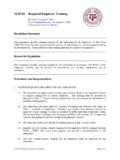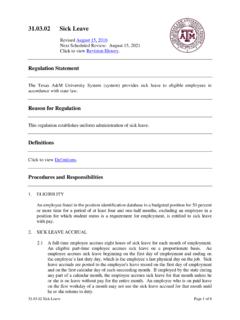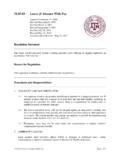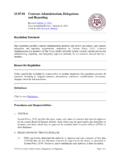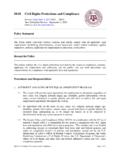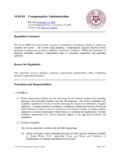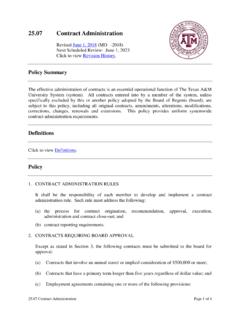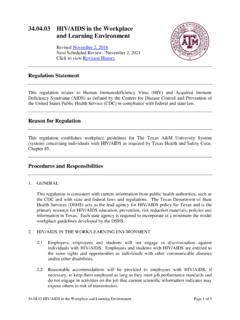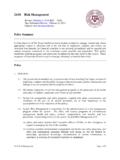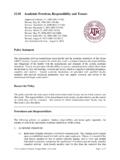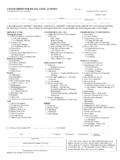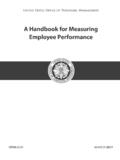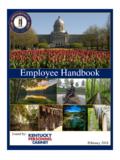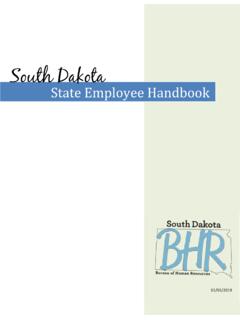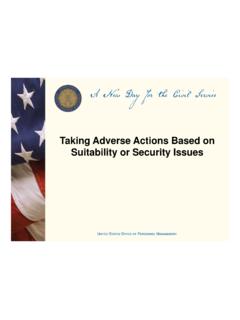Transcription of 07.03 - Conflicts of Interest, Dual Office Holding and ...
1 Conflicts of Interest, Dual Office Holding and Political Activities Revised August 23, 2017 (MO -2017). Next Scheduled Review: August 23, 2022. Click to view Revision History. Policy Statement There are many statutory requirements the members of the Board of Regents (board) and employees of The Texas A&M University System (system) must follow to ensure no Conflicts of interest exist while they carry out their public duties. Such requirements include filings with the Texas Ethics Commission and rules surrounding the Holding of public and private Office . Reason for Policy This policy lists the statutory requirements for filings with the Texas Ethics Commission, gives board members and employees direction on when they may and may not hold public and private Office and provides guidance on their participation in the political process as it relates to their position within the system. Definitions Click to view Definitions. Procedures and Responsibilities 1. Conflicts OF INTEREST. Board members, the chancellor and member chief executive officers (CEOs) are required by state law to file a financial statement with the Texas Ethics Commission annually.
2 Forms prescribed by the commission shall be utilized. With the exception of board members, a copy of such forms shall be filed in the Office of the Board of Regents. Deputy chancellors, vice chancellors, the chief auditor, the general counsel, the system ethics and compliance officer, other members of the chancellor's executive committee, vice presidents and all employees who exercise discretion with regard to the investment of funds under the control of the system, shall file annually with their respective member CEOs an Annual Financial Disclosure Report disclosing detailed information regarding themselves, their spouses and their dependent children. Conflicts of Interest, Dual Office Holding and Political Activities Page 1 of 7. The Annual Financial Disclosure Form is maintained by the Office of General Counsel (OGC) and is available online (see Related Statutes section). Any outside employment of the chancellor, including serving on the board of directors of a corporation, shall be approved in advance by the chairman of the board or the chairman's designee.
3 As state officers, board members, the chancellor, presidents and agency directors are required to disclose any legal or equitable interest in property that is to be acquired with public funds. Such disclosure shall be made by filing an affidavit containing specific information as required by Tex. Gov't Code The affidavit must be filed with the county clerk of the county in which the individual resides and the county clerk of each county in which the property is located. Such filing must be completed within 10. days before the date on which the property is to be acquired by purchase or condemnation. Certain Contracts Prohibited The system and its members are prohibited from entering into a contract for the purchase of goods or services with a private vendor if any of the following employees or their close family members have a financial interest in the vendor: (a) the following system employees or those employees having job duties equivalent to the listed employees: chancellor;. chief financial officer.
4 Vice chancellor;. chief auditor;. general counsel;. chief compliance officer; or chief procurement officer or director;. (b) the following member employees or those employees having job duties equivalent to the listed employees: CEO;. provost;. chief financial officer;. vice president;. dean;. deputy or associate agency director;. chief compliance officer; or chief procurement officer or procurement director;. (c) In this section, close family member means any person related to an employee listed in Sections (a) or (b), within the second degree of affinity (marriage) or consanguinity (blood). See Appendix for a listing of these relatives. Conflicts of Interest, Dual Office Holding and Political Activities Page 2 of 7. The employees listed in Sections (a) and (b) shall promptly disclose to the system general counsel and to their supervisor the existence of a financial interest with a private vendor that may prohibit the system or the respective member from entering into a contract with the vendor.
5 An employee listed in Sections (a) or (b) has a financial interest in a private vendor if the employee or the employee's close family member: (a) owns or controls, directly or indirectly, an ownership interest of at least one percent in the private vendor, including the right to share in profits, proceeds, or capital gains; or (b) could reasonably foresee that a contract with the private vendor could result in a financial benefit to the employee. A financial interest prohibited by this section does not include a retirement plan, a blind trust, insurance coverage, or an ownership interest of less than one percent in a corporation. Disclosure Requirement. No later than the end of January each year, the employees listed in Sections (a) and (b) shall file with OGC a completed Financial Interest Disclosure and Certification Form. OGC will coordinate with the System Office of Budgets and Accounting to ensure system and member compliance with the contracting prohibition. Board of Regents' Consideration of Contracts For contracts presented to the board of regents, a member is permitted to enter into a contract or other transaction with a business entity in which a board member has an interest if the interest is not a substantial interest or, if the interest is a substantial interest, the board member discloses that interest in a meeting held in compliance with the Open Meetings Act (Chapter 551, Government Code) and refrains from voting on the contract or transaction.
6 Any such contract or transaction presented to the board must be approved by an affirmative majority of the board members voting on the contract or transaction. For purposes of this section, a board member has a substantial interest in a business entity if: (a) the board member owns one percent or more of the voting stock or shares of the business entity, or owns either one percent or more or $15,000 or more of the fair market value of the business entity;. (b) funds received by the board member from the business entity exceed one percent of his or her gross income for the previous year;. (c) the board member is an officer of the business entity or a member of the governing board of the business entity; or (d) the board member's parent, child, spouse or spouse's child has an interest in the business entity as described by Section (a), (b) or (c). Conflicts of Interest, Dual Office Holding and Political Activities Page 3 of 7. The board is not precluded from entering into a contract or other transaction with a nonprofit corporation merely because a board member also serves as a member, director, officer or employee of the nonprofit corporation.
7 Employees are prohibited from having a direct or indirect financial or other interest, engaging in a business transaction or professional activity, or incurring any obligation that is in substantial conflict with the proper discharge of the employee's official duties and responsibilities. As soon as possible after becoming aware of any potential conflict of interest, a board member shall disclose such fact and any other relevant information to the general counsel. In such an event, the general counsel shall review the potential conflict and issue an opinion. Any member employee who exercises discretion or makes decisions regarding the award of a bid or contract with a private vendor shall promptly disclose to the member CEO or designee on the Potential Conflict of Interest Disclosure Form any potential conflict of interest that is known by the employee with respect to any contract with a private vendor or bid for the purchase of goods or services from a private vendor by the member.
8 The disclosure obligation created by this section applies at all times during the following time periods: the procurement process, from the initial requests for bids for the purchase of goods or services from a private vendor until the completed final delivery of the goods or services; or the term of a contract with a private vendor. A potential conflict of interest under this section means an interest, financial or otherwise, that could potentially conflict with the conscientious performance of an employee's official duties and responsibilities, including interests that could create the appearance of impropriety. System Policy , Ethics, provides additional guidance on Conflicts of interest that board members and employees must avoid. 2. DUAL Office Holding . Non-elective State or Federal Office Board members and employees may hold non-elective offices with boards, commissions and other state and federal entities provided that the Holding of such Office (a) is of benefit to the state of Texas or is required by state or federal law, and (b) is not in conflict with the board member's or employee's position within the system.
9 In the case of employees, such appointments must be approved by the member CEO. Prior to the chancellor or a member CEO accepting an invitation to serve in an additional non-elective Office , the board must determine that the appointment meets the two requirements stated above. The board must also make an official record of any compensation to be received by the chancellor or member CEO. from such appointment, including salary, bonus, per diem or other types of compensation. Employees may hold other positions of employment with agencies, boards, commissions or other entities of government as long as the Holding of such positions is consistent with Conflicts of Interest, Dual Office Holding and Political Activities Page 4 of 7. the prohibitions against dual Office Holding in the Texas Constitution. Consulting arrangements with federal, state or local governmental agencies of a detached and independent advisory nature are not considered to be appointments with such agencies. 3. POLITICAL ACTIVITIES.
10 Restrictions on Members, Board Members and Employees A member may not use any money under its control, including appropriated money, to finance or otherwise support the candidacy of a person for an Office in the legislative, executive or judicial branch of state government or of the government of the United States. This prohibition extends to the direct or indirect employment of a person to perform an action described by this section. A board member or employee may not use a state-owned or leased vehicle for a purpose described by Section A member may not use appropriated money to attempt to influence the passage or defeat of a legislative measure. This section does not prohibit a board member or employee from using state resources to provide public information or to provide information responsive to a request. Board members and employees shall not use their official authority or influence, or permit the use of a program administered by the system to interfere with or affect the result of an election or nomination of a candidate or to achieve any other political purpose.
